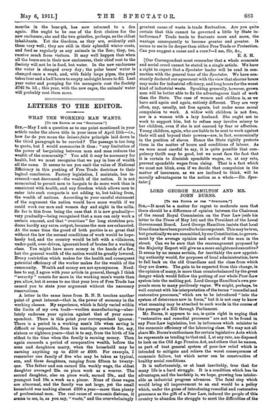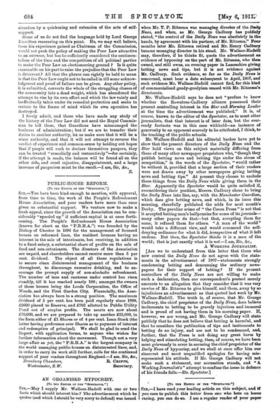LORD GEORGE HAMILTON AND MR.. JOHN BURNS.
[To TIM EDITOR OF THY " SPRCTATOP.."] must be a matter for regret to moderate men that there should be a difference of opinion between the Chairman of the recent Royal Commission on the Poor Law (vide his letter to the Times of May 1st) and the President of the Local Government Board. Lord George Hamilton insists that local Guardians have been proved to be incompetent. This may be true, but practically we are committed, by our Constitution, to govern- ment by the average opinion and action of the man in the street. Can we be sure that the rearrangement proposed by the Majority Report will give us a more enlightened executive ? It seems by no means certain, for inevitably the new appoint- ing authority would, for purposes of local administration, have to fall back on the old Guardians and the class from which they are drawn. The gain to be expected from this change, in the opinion of many, is more than counterbalanced by the great danger which would follow the putting of our whole Poor-Law system into the melting pot. Lord George Hamilton's own pro- posals seem to many perilously vague. We might, perhaps, be well content with his interpretation of the terms " remedial and restorative processes," which are to be introduced " into the system of deterrence now in force," but it is not easy to know what meaning may be attached to such words in the course of the passage of a Bill through Parliament.
Mr. Burns, it appears to me, is quite right in urging that "restorative and remedial processes" are not to be found in any Poor-Law legislation, but in influences which minister to the economic efficiency of the labouring class. We may not all share Mr. Burns's enthusiasm for certain legislative Acts which he represents as tending to that end. I, at any rate, am disposed to look on the Old Age Pension Act, and others that he names, as part of that general system of poor-law relief which is intended to mitigate and relieve the worst consequences of economic failure, but which never can be constructive of healthy social conditions.
It is unfortunately, or at least inevitably, true that for many life is a hard struggle. It is a condition which has its advantages, and the hardship is, we hope, growing less intoler- able as industrial progress advances. The fatal step which would bring all improvement to an end would be a policy which, under the guise of introducing remedial and restorative processes as the gift of a Poor Law, induced the people of this country to abandon the struggle to meet the difficulties of the
situation by a quickening and extension of the arts of self- support.
Some of Us do not find the language held by Lord George Ilamilton reassuring on this point. He, we may well believe, from his experience gained as Chairman of the Commission, mould not push the policy of making the Poor Law attractive to an extreme, but has he sufficiently considered the sentimen- talism of the time and the competition of all political parties to make the Poor Law an electioneering ground P Is it quite reasonable on his part to raise the prejudice that the Poor Law is deterrent? All that the phrase can rightly be held to mean is that the Poor Law ought not to be called in till some acknow- ledgment and proof of failure can be given. Any other policy, it is submitted, converts the whole of the struggling classes of the community into a dead weight, which has abandoned the attempt to rise by its own effort and which the law vainly and ineffectually takes under its remedial protection and seeks to restore to the frame of mind which its own operation has destroyed.
I freely admit, and those who have made any study of the history of the Poor Law did not need the Royal Commis- sion to tell them, that Guardians have mismanaged the business of administration; but if we are to transfer their duties to another authority, let us make sure that it will be a wiser authority, and that it will not attempt to reverse the verdict of experience and common-sense by holding out hopes that if people will rush to declare themselves paupers, they can be treated " remedially and restoratively "—for certainly, if the attempt is made, the balance will be found all on the other side, and cruel injustice, disappointment, and a large increase of pauperism must be the result.—I am, Sir, &c.,
Z.











































 Previous page
Previous page